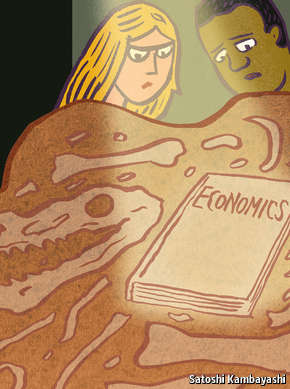This had consequences. Aspiring economists were ill-prepared to analyse major economic issues such as quantitative easing, the credit crunch and bank bail-outs. This led to employers complaining that although their employees were able to deal with technical things, they had problems relating it to the real world. In particular, university graduates had weak knowledge of economic history, which was important in making sense of the financial crisis as it had parallels with the Great Depression in the 1930s.
Employers were not the only dissatisfied group. Students were unhappy as well. A London-based student-led group called Rethinking Economics was formed to challenge the conventional wisdom of the classroom. Manchester University experienced a backlash from its students, causing it to have lower student satisfaction scores and as a result, it placed lower on the league tables.
The good news is that teachers are taking action to tackle this problem. A new curriculum has recently been introduced in University College London. This was the result of Professor Wendy Carlin's project. According to her, "The old textbooks had things the wrong way around. They taught concepts like supply and demand in an abstract way and then illustrated them with simple examples, such as the market for apples and oranges. By contrast, the new material challenges students to consider real-world topics from the outset."
However, although Ms. Carlin has challenged the mainstream teachings, the course still appears to be fairly typical. Rethinking Economics desires a curriculum that teaches the more unorthodox schools of thought. For instance, economic models normally depend on the equilibrium concept but the issue with that is that it does not happen in the real world therefore, it is a bad starting point. They believe that it is better to adopt philosophical discussions about the best approach to economics and sees Leeds, Greenwich and Kingston universities as models of how this can be achieved.
There are two rather different questions that have been presented. The first one asks if university courses are able to educate students with the most important insights from academic research. The second one asks whether students should be more proactive and learn more outside the curriculum. The curriculum deviating radically from the norm will surely be considered an oddity but perhaps mainstream theory must catch up with its students.

No comments:
Post a Comment